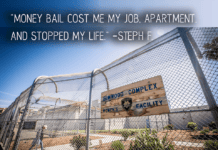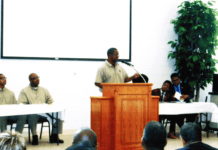by The People’s Minister of Information JR
“In An Ideal World” is one of the most important documentary films in the San Francisco Black Film Festival this year considering that its subject is prisoners and over 1 million Black people and 2 million people in general are locked up in the bowels of this country’s concentration camps. Soledad Prison, where the documentary is set, is one of these concentration camps located in central California. Very few people are privy to what goes on behind its walls and gates, unless you are forced to live there.

Filmmaker Noel Schwerin is someone who is concerned about the way prisoners are classified and housed in racially segregated units in California and around the United States. Surprisingly, in the documentary, prisoners, the warden and the guards think that prison segregation is the safest way to run the prison considering the racial politics behind the barbed wire gates.
Come check out “In an Ideal World” at the San Francisco Black Film Festival as well as meet the filmmaker Noel Schwerin and one of the former prisoners in the film to discuss this and many other issues dealing with the human rights of prisoners. “In An Ideal World” screens on Saturday, June 13, at 6 p.m. at the Second Act Theater, 1727 Haight St. Check out Noel Schwerin in her own words.
M.O.I. JR: What part did you play in making “In an Ideal World”? Where did the concept come from?
Noel Schwerin: I produced, directed and, in the end, taught myself to edit and edited the film.
I had a friend who did volunteer work inside prison and I was very interested in alternatives to violence, to incarceration, to what some think is “inevitable” for some of our fellow Americans. As soon as I went inside, I was struck by the unapologetic use of power, the institutional seal of approval of the use of power, and how that power and hierarchy was defined and maintained along racial and ethnic lines.
“In An Ideal World” screens on Saturday, June 13, at 6 p.m. at the Second Act Theater, 1727 Haight St.
M.O.I. JR: In your words, what is the film about?
Noel Schwerin: It is about the deep and uniquely human capacity for survival, growth and change.
M.O.I. JR: Why do you think it is important for people on the outside to hear the voices and see the faces of prisoners?
Noel Schwerin: America’s criminal justice policy is driven and perpetuated by fear. While fear governs, little meaningful discussion, analysis or change is likely, for institutions, communities or individuals.
I hope “In An Ideal World” will draw people past fear to experience prison directly, to bear witness to the impact of policies, and to invite scrutiny about the role of race and power in our “locked down” society. Such previously unheard stories compel viewers to grapple tangibly and deeply with prejudice, shared humanity, and the dire threat a criminalized race order makes to fundamental civil and human rights. “In An Ideal World” exposes – and honors – the human drama at its core.
M.O.I. JR: Why was it important for you to deal with prisoners of different races in the film?
Noel Schwerin: First, because that is what I found, and it had great meaning. Prison is society brought into high relief, but perhaps without some of the diversions that tempt us to think that the way things are is how they should be. Ranking and ordering – or, as the film shows, classifying – people usually serves a purpose, even if it’s so deeply embedded that it’s hard to see.
I hope “In An Ideal World” will draw people past fear to experience prison directly, to bear witness to the impact of policies, and to invite scrutiny about the role of race and power in our “locked down” society.
What I mean to say is that it is very hard to unpack racial ordering in American institutions – schools, banks, businesses – but that in prison it is explicit and unrepentant. Race is the power landscape. And that power is dutifully – and in many ways tragically – perpetuated up and down the chain of command, for both inmates and staff.
Can’t talk about prison without talking about race, but then that should be true about every American institution.
M.O.I. JR: What was it like to interview the warden of Soledad one day, then a Black prisoner who is locked up for multiple murders?
 Noel Schwerin: I actually found that these men had a lot in common. They had spent their entire adult lives living or working in prison. They had a lot of time to think about the value of a human life; the meaning of punishment, the costs of lives behind bars.
Noel Schwerin: I actually found that these men had a lot in common. They had spent their entire adult lives living or working in prison. They had a lot of time to think about the value of a human life; the meaning of punishment, the costs of lives behind bars.
They had also been at ground zero for the dramatic escalation of punitive incarceration in this country, and it wasn’t always like this. The warden was a correctional officer when the idea of rehabilitation meant something and when drug abusers and the mentally ill were not life term prisoners.
The older inmates like Ernest Kirkwood came into the system at a time when the only two classes were the green and blue – the imprisoned and those that imprisoned. They’ve both witnessed the exponential growth of the prison state, and it rubs them both the wrong way.
I actually found that these men had a lot in common. They had spent their entire adult lives living or working in prison. They had a lot of time to think about the value of a human life; the meaning of punishment, the costs of lives behind bars.
In terms of my experience of talking to them, neither impressed me as anything other than men reaching middle age, trying to make a good life and to make sense of their world. They were both very wise and articulate about it.
M.O.I. JR: Did you feel more loyal to the prisoners or the prison staff and administration? Why?
Noel Schwerin: When I ask someone to share their story, I commit to them, because I want the viewer to be able to commit to them too. There are some people I choose not to film. The ones I do follow – both staff and inmate – I listen to without cynicism or moral judgment because that is how I want my audience to listen.
Nothing happens in a film – or life of that matter – if we do not make a human connection, a moment of identification or empathy. That said, I was very aware of the power imbalance and the ways in which prisoners were by design more vulnerable. I was careful to respect and not exploit that.
M.O.I. JR: Other than the desegregation issue that you addressed heavily in your film, did you see any other human rights issues that need to be addressed?
Noel Schwerin: While I was making the film, I learned that one in every three African American young men would spend time behind bars if current trends continued. I cannot describe how that made me feel.
I have teenage boys. (They grew up with this film! I started when they were about 6!) How can anyone, especially a mother, sit with that number?
To marginalize people, it is critical to dehumanize them. We have done that in American prisons – and society. When I began the film I was very interested in the brutal fact of men on either side of bars. What made it possible to sustain that and what would it take to change it?
Stereotypes and fear play a big role. We punish what we fear in ourselves, but first we create the “other” to blame it on. That room where the men meet and talk and play – that is where the fundamentals of human rights are met: community, trust, play, empathy and shared hope. What happens in that room is both the opposite of and the antidote to what happens in the rest of the prison.
To marginalize people, it is critical to dehumanize them. We have done that in American prisons – and society.
M.O.I. JR: How long did it take for you to film “In an Ideal World”? And what was the creative process like?
Noel Schwerin: Seven years filming … a few more on either end!
Funding was very hard and intermittent, so I would go from periods of filming to long stretches of just visiting. As hard as that was, it allowed me to kind of disappear inside the prison, to gain trust over time and to capture an evolving story.
 I knew in the first visits that I wanted to work with Sam, John and the warden, but I also wanted to capture something about the institution, something that I felt very lucky and privileged to be a witness to. In the end, I had to focus on a few human stories or none of it would matter to an audience. I had to move them as I had been moved and the men in the film had been moved.
I knew in the first visits that I wanted to work with Sam, John and the warden, but I also wanted to capture something about the institution, something that I felt very lucky and privileged to be a witness to. In the end, I had to focus on a few human stories or none of it would matter to an audience. I had to move them as I had been moved and the men in the film had been moved.
I have many more stories to tell. Maybe I’ll get a chance to tell them!
M.O.I. JR: How did you get the kind of access into the prison that you did for this documentary?
Noel Schwerin: A combination of very careful listening to what people were afraid of, luck and timing. I tried as much as I could to stay below the radar of the powers that be, and I think that served me. I never knew when the door would close.
M.O.I. JR: Are you working on any other prison documentaries? Or docs in general?
Noel Schwerin: Not at the moment, though I am very interested in using the footage I shot that is not in this film, and I am working with folks to tell those stories and to make the film and its other material useful to people who are affected. For me, the project just BEGINS when the film is released.
M.O.I. JR: How did it feel to be selected to screen in the San Francisco Black Film Festival?
Noel Schwerin: Like I really reached my audience. I am thrilled.
Come check out “In an Ideal World” at the San Francisco Black Film Festival as well as meet the filmmaker Noel Schwerin and one of the former prisoners in the film to discuss issues dealing with the human rights of prisoners.
M.O.I. JR: When does your film screen at the San Francisco Black Film Festival?
Noel Schwerin: Saturday, June 13, at 6 p.m. at Second Act Theater on Haight Street.
M.O.I. JR: How could people keep up with you and “In an Ideal World”?
Noel Schwerin: Follow the website www.idealworldfilm.org and the Facebook page, and please feel free to contact me at impact@backbonemedia.org. I am especially interested in hearing from you if you think you could use the film in your community.
The People’s Minister of Information JR Valrey is associate editor of the Bay View, author of “Block Reportin’” and “Unfinished Business: Block Reportin’ 2” and filmmaker of “Operation Small Axe” and “Block Reportin’ 101,” available, along with many more interviews, at www.blockreportradio.com. He can be reached at blockreportradio@gmail.com.

 Store
Store











